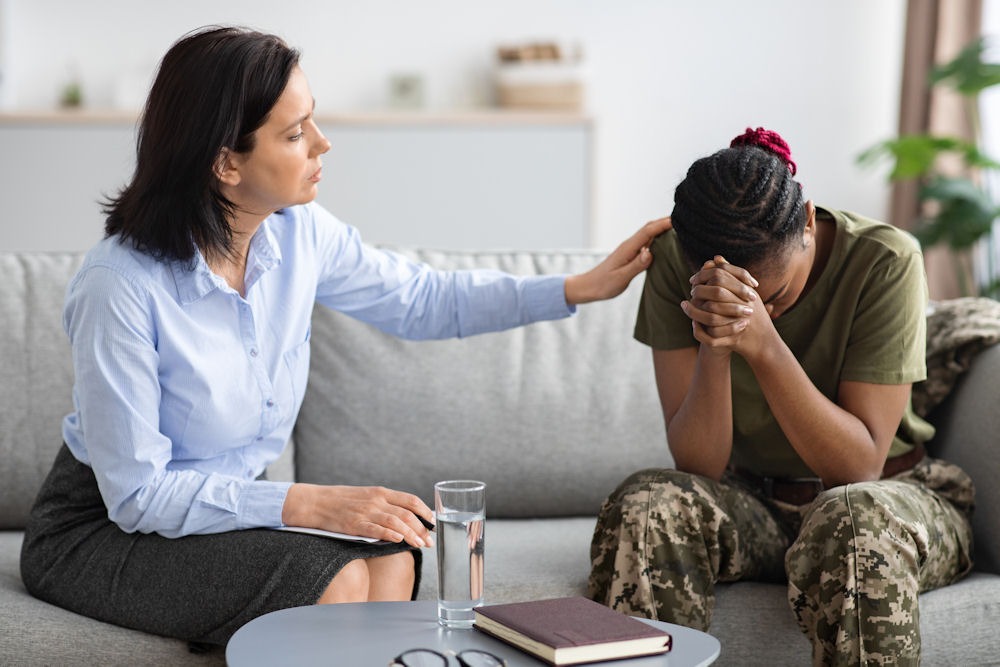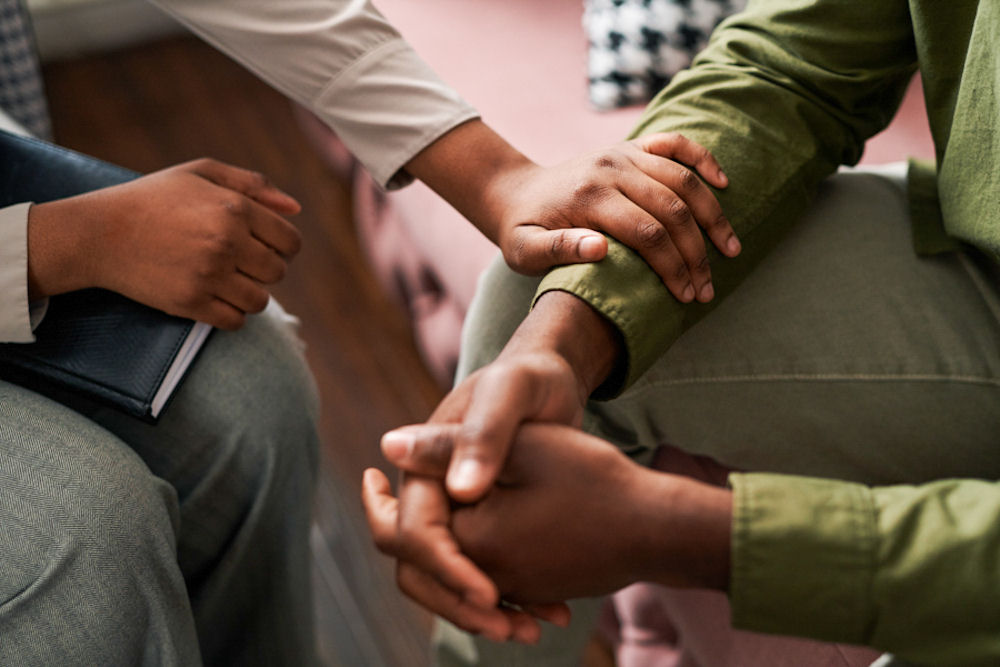PTSD Treatment in Maryland
PTSD doesn’t look the same for everyone, but the emotional and physical toll can be life-changing and deeply disruptive. That’s why we offer therapy options tailored to your story, your age, and your unique healing goals. If you’re looking for compassionate, culturally aware treatment that truly sees the whole person, we’re here to offer you help. Explore our mental health disorder treatment and dual diagnosis services to learn more about how we can best support you with care, clarity, and connection.

What is PTSD?
PTSD, or post-traumatic stress disorder, is a serious mental health condition that can develop after living through or witnessing a traumatic event or series of events. People with PTSD may continue to feel intense fear, anxiety, or emotional distress long after the threat of the traumatic event is gone.
This condition affects the brain’s ability to distinguish between past and present danger. That’s why everyday situations can unexpectedly trigger panic attacks, painful flashbacks, overwhelming emotions, and/or even complete emotional shutdowns. While some people recover from trauma naturally over time, more commonly, others need professional support to move forward with everyday life and regain a sense of safety.
If left untreated, PTSD can worsen and lead to other complications like substance use, fits of anger or rage, depression, chronic stress, and/or even suicidal thoughts. Getting the right help and guidance can truly change the course of someone’s life for the better.
Common Causes of PTSD in Adults and Teens
PTSD can happen to anyone, regardless of age, background, or life circumstances, and there’s no single way trauma shows up. The most common causes of PTSD we see in Maryland and the DMV area include but are not limited to:
- Physical or sexual abuse
- Domestic violence
- Community or gang violence
- Car accidents or serious injuries
- Military service or combat
- Childhood neglect
- Witnessing a sudden death
- Natural disasters like floods or fires
In urban and suburban areas of the DMV region, trauma may also stem from ongoing community violence, generational poverty, immigration struggles, or systemic racism and discrimination. These stressors can contribute to long-term emotional trauma that may not be immediately recognized as PTSD but still deeply affects how individuals think, feel, and function in their everyday lives, relationships, and sense of self-worth.
What PTSD Symptoms Can Look Like
The symptoms of PTSD often fall into four categories: intrusive thoughts, avoidance, negative mood changes, and heightened reactions. These symptoms can interfere with work, school, relationships, physical health, and our daily routines.
Some common PTSD symptoms include:
- Flashbacks, nightmares, or distressing memories
- Avoiding people, places, or conversations that trigger reminders of the trauma
- Feeling emotionally numb, hopeless, or isolated from others
- Hypervigilance or being easily startled, even in safe environments
- Trouble sleeping, concentrating, or staying present
- Sudden outbursts of anger, irritability, or aggression
- Panic attacks or chronic anxiety that feel uncontrollable
- Turning to drugs, alcohol, or risky behavior to cope with emotional pain
For many people in Maryland and the surrounding DMV area, these symptoms can build over time and get progressively worse without intervention. What starts showing up as anxiety or insomnia may evolve into serious mental health struggles without the proper support, often wreaking havoc in one’s life, relationships, and sense of identity.
PTSD in Adults vs. Adolescents
Adults with PTSD often appear anxious, withdrawn, or overwhelmed by memories and certain social situations. Many will carry unspoken guilt or shame, even when the trauma wasn’t their fault. These deep-rooted feelings can create a “masking” type of defense mechanism in adults with PTSD and can lead to isolation, difficulty holding jobs, strained work and personal relationships, and emotional burnout.
Adolescents, however, often show signs of trauma in ways that may resemble common teenage rebellion, mood swings, or emotional withdrawal. Their behaviors—whether acting out, isolating, or shutting down—can appear to be typical growing pains. But the truth is, many young people simply don’t yet have the tools to process or talk about what they’re going through. As a result, their struggles are frequently misunderstood, mislabeled, or overlooked altogether. In reality, a significant number of teens in the DMV area are quietly carrying the heavy weight of unresolved trauma and emotional confusion.
At Elevated Wellness Clinic, we create age-appropriate, judgment-free spaces for healing. We also involve families in the process so caregivers can better understand, support, and communicate with their loved ones throughout recovery.

What PTSD Treatment Looks Like at Elevated Wellness Clinic
Here’s what mental health therapy and treatment may include at our clinic:
Our one-on-one therapy sessions provide a safe, private space to process trauma at your own pace. We use evidence-based treatments such as:
- Cognitive Behavioral Therapy (CBT)
- Trauma-Focused CBT (TF-CBT)
- Eye Movement Desensitization and Reprocessing (EMDR)
- Narrative therapy
- Acceptance and Commitment Therapy (ACT)
We also adjust our treatment style depending on the individual’s needs, preferences, and emotional readiness. For example, younger teens may benefit from creative expression therapies, such as art or journaling, while adults may prefer more structured cognitive work that helps them challenge long-held beliefs and patterns.
You’re not alone. Many people in the DMV area are dealing with trauma, and sharing your journey with others can be a powerful part of recovery and growth. Group therapy offers validation, connection, hope, and even lasting friendship.
When trauma affects a teen, it impacts the whole family system and dynamic. Our therapists help caregivers create safe, supportive environments at home by improving communication, emotional awareness, and understanding for your loved ones.
For some people, medication can help relieve anxiety, depression, or panic attacks associated with PTSD. Our medical team takes a holistic, thoughtful, and individualized approach to medication support to ensure that the right treatment path is given to each client that is entrusted in our care.
Healing from trauma means supporting the whole person, mind, body, spirit, and emotional well-being. We offer culturally competent care rooted in trust and respect. Whether your trauma is linked to identity, environment, or past experiences, we honor your unique story with care, compassion, and commitment to lasting change.
PTSD in the DMV Area: Why Local Care Matters
Finding PTSD treatment in Maryland and the DMV area means finding care that truly understands the challenges of your community and lived experiences. From high-pressure careers to community violence, the types of trauma people face here are often very complex and unique in nature. So should be your treatment plan, personalized, flexible, and rooted in real understanding.
We’re proud to offer services that reflect the specific needs of our region. Whether you live in the heart of Baltimore, the District, or the suburbs of Northern Virginia, our team is here to provide grounded, effective, and personal PTSD support you can trust.

Healing Takes Time, But You Don’t Have to Do It Alone
We work with people of all ages, cultures, and backgrounds and create treatment plans based on who you are, not just your PTSD symptoms. Whether you’re ready to start today or just exploring your options, we’re here when you need us, with open arms and an open heart.
What to Expect When You Reach Out
From there, we’ll schedule a personalized assessment to get to know you better, your history, your goals, and your story. Once we fully understand your needs, we’ll build a treatment plan that feels right for you and supports sustainable healing.
We accept most major insurance plans and offer both in-person and virtual options for individuals in Maryland and throughout the DMV area, making it easy to access care that fits your lifestyle.
If you or a loved one is living with PTSD or another mental health condition, we invite you to reach out. Explore our therapy and treatment options or call us today to get started. You don’t have to do this alone.
